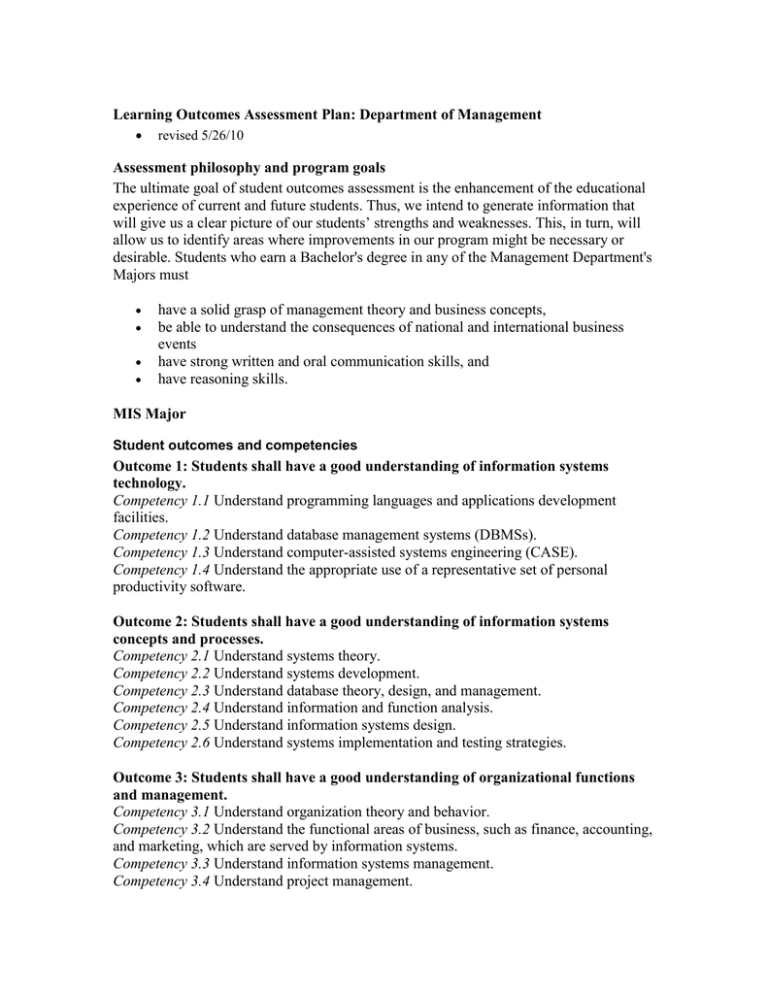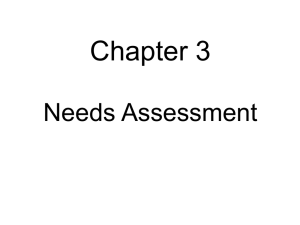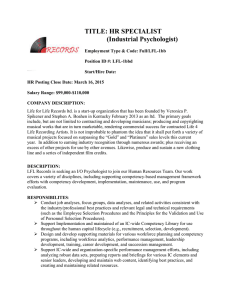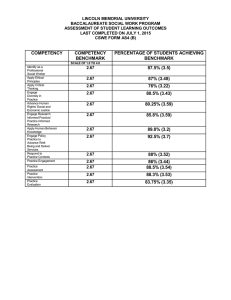Learning Outcomes Assessment Plan: Department of Management
advertisement

Learning Outcomes Assessment Plan: Department of Management revised 5/26/10 Assessment philosophy and program goals The ultimate goal of student outcomes assessment is the enhancement of the educational experience of current and future students. Thus, we intend to generate information that will give us a clear picture of our students’ strengths and weaknesses. This, in turn, will allow us to identify areas where improvements in our program might be necessary or desirable. Students who earn a Bachelor's degree in any of the Management Department's Majors must have a solid grasp of management theory and business concepts, be able to understand the consequences of national and international business events have strong written and oral communication skills, and have reasoning skills. MIS Major Student outcomes and competencies Outcome 1: Students shall have a good understanding of information systems technology. Competency 1.1 Understand programming languages and applications development facilities. Competency 1.2 Understand database management systems (DBMSs). Competency 1.3 Understand computer-assisted systems engineering (CASE). Competency 1.4 Understand the appropriate use of a representative set of personal productivity software. Outcome 2: Students shall have a good understanding of information systems concepts and processes. Competency 2.1 Understand systems theory. Competency 2.2 Understand systems development. Competency 2.3 Understand database theory, design, and management. Competency 2.4 Understand information and function analysis. Competency 2.5 Understand information systems design. Competency 2.6 Understand systems implementation and testing strategies. Outcome 3: Students shall have a good understanding of organizational functions and management. Competency 3.1 Understand organization theory and behavior. Competency 3.2 Understand the functional areas of business, such as finance, accounting, and marketing, which are served by information systems. Competency 3.3 Understand information systems management. Competency 3.4 Understand project management. Competency 3.5 Understand change management. Competency 3.6 Understand legal and ethical aspects of information and information systems. Competency 3.7 Understand professional conduct in the information systems field. Competency 3.8 Understand how management information systems enhance decision making. Outcome 4: Students shall have developed effective information systems management skills Competency 4.1 Be able to assist in defining and planning information systems. Competency 4.2 Be able to elicit information requirements for applications and assist in designing information systems. Competency 4.3 Be able to implement non-complex (routine) information systems applications. Competency 4.4 Be able to manage information systems development and operations. Outcome 5: Students shall be able to communicate effectively. Competency 5.1 Be able to prepare and present expected outputs from the analysis, design, implementation, and maintenance phases of information system development. Competency 5.2 Be able to write formal, clear, and accurate documentation of information systems. Competency 5.3 Be able to orally communicate information systems ideas effectively. Frequency of Assessment Assessment will take place on an annualized cycle by assessing students who are at four different phases of their education: Declaration of Major Mid Program, having taken both Systems Analysis and Design (MGMT 3112) and Database Management and Theory (MGMT 3120) Senior Year, usually while enrolled in MIS Policy (MGMT 3125) During the first two years post graduation Assessment Methods Upon declaration of the major using CBA admission criteria. Mid Program: grades in the targeted courses and overall GPA. If the performance of any student is not satisfactory, an interview will be arranged to discuss the situation. Program Completion: A comprehensive machine-scored test will be administered during the MIS Policy capstone course during the first year of outcomes assessment implementation. In subsequent years the test may be administered on an as-needed basis to assess students' potential to pursue graduate study and/or professional certification. After the first year of outcomes assessment implementation, students will be required to develop a portfolio of projects, papers, and any other relevant material that conveys their capabilities. Prescribed contents will be made available to students and contents of the portfolio will be examined a the beginning and at the end of the MIS Policy course. Students will be expected to have a complete portfolio in order to receive a passing grade in the MIS policy course. The portfolio will contain copies without letter grades of student-selected work from courses such as Database Management and Theory, Systems Analysis and Design, MIS Policy, Decision Systems, Systems Development and Administration, and Cooperative Education. The instructorgenerated "co-op report" could also be included. The portfolio will be used to evaluate the curriculum in terms of support toward the competencies previously stated. The portfolio may assist students in the job-search process. Post Graduate: The department will work with the Office of Career Planning and Placement to collect evaluative information from all recent graduates. The desired data will track such outcome elements as job title, salary range, responsibilities, and fit between a) what students were prepared to do and what they are doing and b) what the external needs actually are compared to the assumed needs the program is addressing. Outcome elements will be collected by annual questionnaires and/or phone surveys. Methods of Analyzing and Interpreting results The department Outcomes Assessment Committee will collect the aforementioned data annually and prepare a report summarizing the extent to which the desired outcomes are being met. This report will be presented to the department as a whole. the department will respond to the findings presented in the report by modifying the assessment process or making changes in the curriculum. A report will be submitted to the appropriate university officials.






